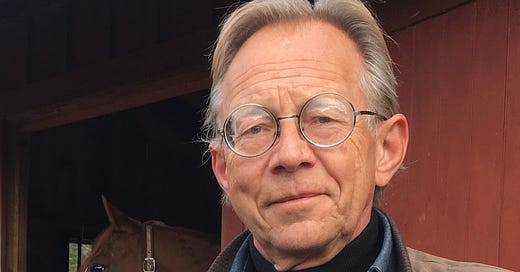When 87-year old Hildegard Mott was discharged from the hospital for the last time she was given less than six months to live. Her aortic stenosis was severe enough to cause chest pain at the slightest exertion, yet if she took nitroglycerin she invariably passed out. Sometimes she would pass out even without taking nitro.
She was given a prescription for liquid morphine to take if her chest pain became unbearable and Hospice nurses started to visit her a couple of times a week in her modest but spotless trailer in the Rainbow Hills trailer park just outside town.
The hardest part about coming home was that Sumner, her husband, friend and soul mate, wasn’t there. He had died from a stroke just before Hildegard ended up in the hospital.
My house calls were special for both of us. She treated me like a son and never failed to tell me about her Scandinavian grandparents. Her own two sons live far away and I live an ocean away from my own mother. She told me of her symptoms and her worries. She knew her remaining days were limited; I had to certify a number less than the cutoff for Hospice services. Ironically, it was the hospitalists’ idea to sign her up for Hospice, but I ended up certifying her prognosis.
She often spoke of Sumner in present tense. “I know he is here”, she often said. “He comforts me when I am sad and calms me when my anxiety builds up. He helps me remember where I put things.”
She seemed to hold her own as far as her symptoms went, but her days were long and her nights were lonely.
“I don’t know why I am still alive”, she would say. “If God wants me, I’d be happy to go.”
“He must still have plans for you here”, was my usual reply.
Many months went by and Hildegard had very little chest pain. She almost never took morphine and she seemed to know exactly how to pace herself. She always looked for the bright spots in everything that happened and lived her life in one-day increments.
Hospice finally terminated her case and she saw fewer interruptions in her solitude. She was weaker, there was no question about that, even though the more dramatic manifestations of her condition were less noticeable. She decided to look for placement in a nursing home.
That was four years ago. Hildegard settled in quickly at Leisure Ledges, and I visited her there now and then. Her favorite visits were the ones when I brought samplings of traditional Swedish foods. She always had visitors in her room because of her positive demeanor and kind interest in others.
Last Saturday night, almost five years after the hospital doctors pronounced her terminal, 92-year old Hildegard died in her sleep.



